Consulting Articles > Consulting Case Interviews > Case Interview Prep: Complete Guide for Consulting Candidates
Preparing for a case interview is one of the most important steps in landing a consulting role at McKinsey, BCG, Bain, or other top firms. A case interview tests your ability to solve complex business problems, think on your feet, and communicate clearly under pressure. Successful candidates approach case interview preparation strategically, combining structured problem-solving, mental math practice, and exposure to real case interview examples. Whether you’re wondering how to prepare for a case interview or what to expect on the day, this guide will help you gain the confidence and skills you need.
New to consulting interviews? Start with our What Is a Case Interview overview to understand the basics.
In this article, we will explore everything you should know to succeed in case interviews.
TL;DR – What You Need to Know
- A case interview is a structured consulting interview that tests problem-solving, communication, and analytical skills through real business scenarios.
- The case interview process usually includes a fit interview and a 20 to 40-minute case, with scoring based on structure, math, and recommendations.
- Essential case interview frameworks include profitability, market study, M&A, pricing, 3Cs, and Porter’s 5 Forces, which guide but should not dictate analysis.
- Effective case interview preparation involves 30 to 50 practice cases, mental math drills, and out-loud practice with feedback to build confidence.
- Common mistakes in case interviews include poor structure, weak math, overusing frameworks, and not practicing in realistic conditions.
What is a case interview and why does it matter?
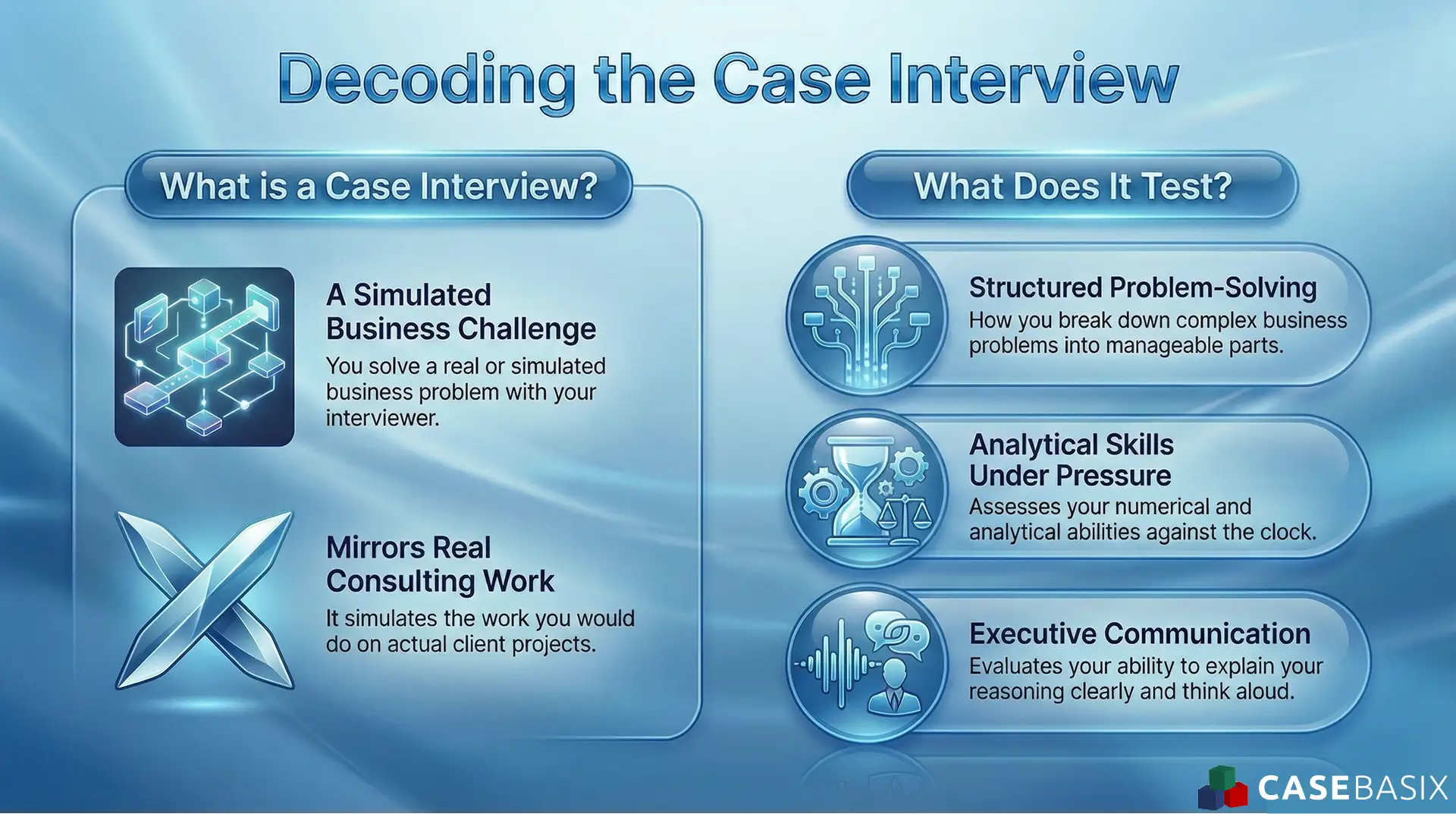
This infographic explains the purpose of a case interview and the core skills it is designed to assess.
This visual clarifies how a case interview mirrors real consulting work and highlights the core capabilities firms assess. Understanding these expectations helps you prepare with focus and confidence.
A case interview is a structured management consulting interview where you solve a real or simulated business problem with your interviewer. The case interview matters because it tests your problem-solving, analytical, and communication skills, making it the most critical stage of consulting recruiting.
In consulting recruiting, the case interview is designed to simulate the work you would do on client projects. Interviewers use it to evaluate both your structured problem-solving and your ability to explain your reasoning clearly.
Key purposes of a case interview include:
- Testing how you break down complex business problems into manageable parts
- Assessing your numerical and analytical skills under time pressure
- Evaluating your executive communication and ability to think aloud
- Judging your fit for the consulting career path and firm culture
For example, you might be asked to analyze declining profitability for a retailer, size a new market opportunity, or assess whether a merger makes sense. Your interviewer is less focused on the “right answer” and more on how logically you reach your conclusion.
The weight of this stage is significant. At many firms, case performance drives most of the hiring decision, often accounting for over half of your overall interview score. This makes strong preparation essential if you want to stand out from other candidates.
What to expect in a case interview process?
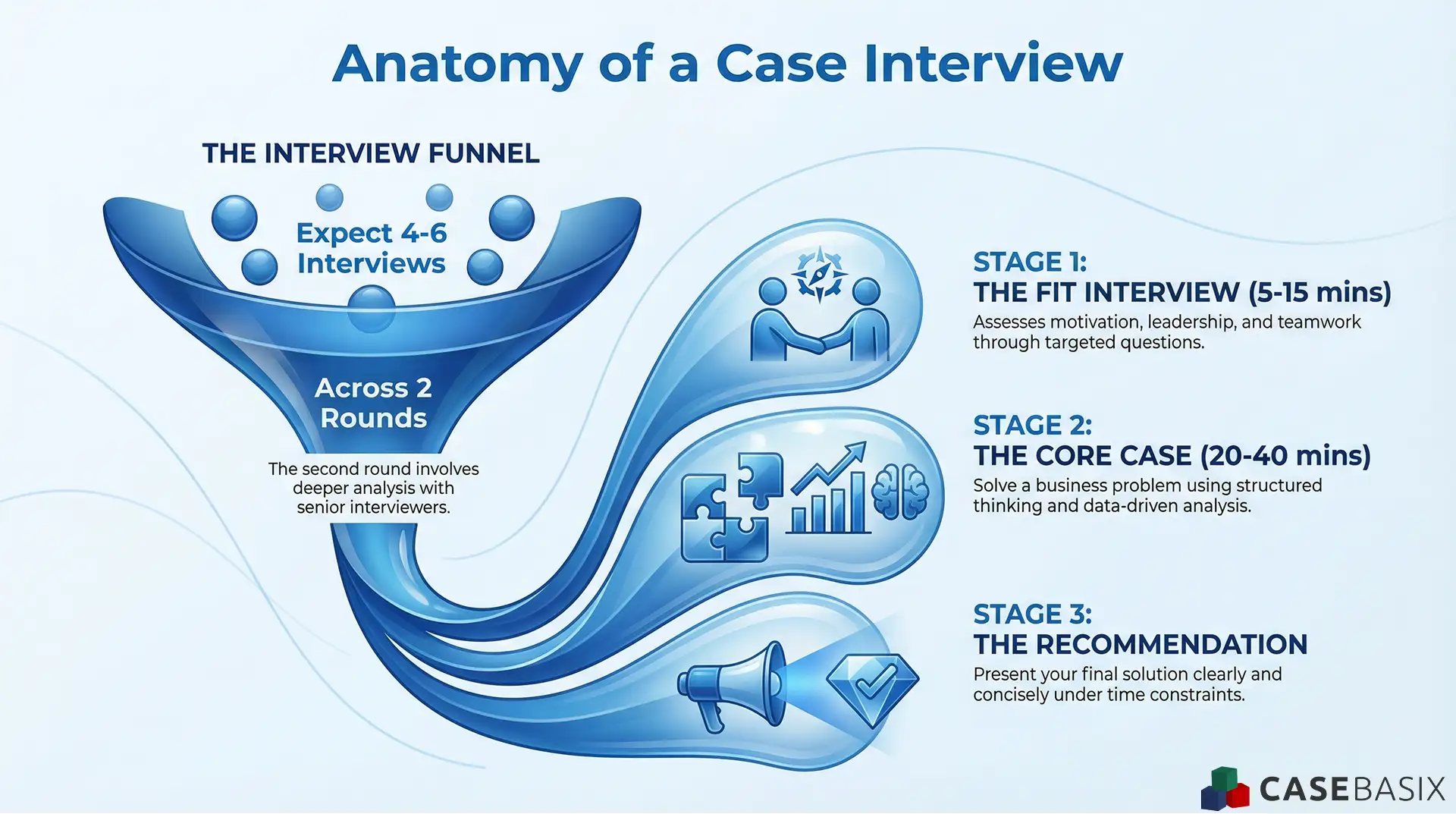
This infographic breaks down the main stages of a case interview to help candidates understand the full structure of the evaluation process.
This visual shows how the case interview progresses from personal fit to structured analysis and finally to recommendations. Understanding each stage helps you prepare more effectively and reduces uncertainty about what interviewers expect.
A case interview process typically includes a short fit interview followed by a structured business case, lasting 20 to 40 minutes. Candidates are assessed on problem-solving, data analysis, communication, and their overall preparation for consulting interviews.
The process is designed to mimic real consulting work and test whether you can think clearly under pressure. While details vary by firm, most case interview processes share these common steps:
- Fit interview (5 to 15 minutes): Questions on motivation, leadership, and teamwork
- Case interview (20 to 40 minutes): Solve a business problem with structured thinking and data-driven analysis
- Recommendation: Present your solution clearly, often under time constraints
In most recruiting cycles, you will complete 4 to 6 interviews split across two rounds. The first round emphasizes general skills and time management, while the second round often involves deeper analysis and senior interviewers who may challenge your assumptions.
Variations do exist. Some firms run group case interviews, while others give candidates a packet of data in advance to prepare a presentation. Still, preparing for a traditional live case interview ensures you are ready for all formats.
How long does a case interview last and how is it scored?
A case interview usually lasts between 20 and 40 minutes, with most candidates completing 4 to 6 interviews across two rounds. Scoring focuses on structured problem-solving, accuracy of analysis, communication, and the clarity of final recommendations.
Timing varies depending on the firm and round. First-round interviews tend to be shorter, often 20 to 25 minutes, with a stronger emphasis on efficiency and time management. Second-round interviews usually run longer, around 30 to 40 minutes, and include more probing questions from senior consultants.
Interviewers generally score candidates on four main dimensions:
- Ability to structure the problem logically
- Accuracy and speed of mental math and data analysis
- Clarity in communicating thought processes
- Practicality and persuasiveness of final recommendations
Performance is evaluated holistically rather than on a single “correct” answer. Strong preparation in both problem-solving and communication is essential to achieve a passing score.
Which case interview frameworks should you know?

This infographic summarizes the essential case interview frameworks candidates use to structure and solve common business problems.
This visual highlights the most widely used case interview frameworks and helps you understand how each one structures problem solving. Reviewing these frameworks builds confidence and improves your ability to adapt them flexibly in real case interviews.
The most important case interview frameworks to know are profitability, market study, mergers and acquisitions, pricing, 3Cs, and Porter’s 5 Forces. These frameworks provide structured approaches to common business problems, but they should be adapted to the specific details of each case rather than applied rigidly.
Frameworks serve as mental blueprints, helping you organize your analysis and communicate clearly. Instead of memorizing dozens, focus on a core set that covers the majority of case interview scenarios.
Key frameworks to master include:
- Profitability framework: Breaks down revenues and costs to find profit drivers
- Market study framework: Analyzes customers, competitors, and industry trends
- M&A framework: Evaluates whether a merger or acquisition creates value
- Pricing framework: Assesses product value, competitor pricing, and market dynamics
- 3Cs framework: Reviews company, customers, and competition holistically
- Porter’s 5 Forces: Examines broader industry forces and competitive pressures
For example, if asked to analyze a retailer’s falling profits, the profitability framework helps you determine whether declining revenues, rising costs, or both are responsible. This structured thinking is what interviewers want to see.
How to use the profitability framework in a case?
The profitability framework is used in a case interview to analyze revenues and costs separately in order to identify the drivers behind profit changes. By breaking down income streams and expense categories, candidates can isolate issues and recommend solutions.
This framework is especially common because many consulting projects involve profit improvement. It helps you structure your thinking around two simple but powerful levers: revenues and costs.
When applying the framework, consider:
- Revenue drivers: Price, volume, product mix, and customer segments
- Cost drivers: Fixed vs. variable costs, labor, materials, operations
- External factors: Market shifts or competitive actions impacting results
For example, if a manufacturer’s profits are falling, the framework can reveal whether declining sales volume or rising input costs are the cause. Once identified, you can propose data-driven actions such as adjusting pricing, streamlining operations, or targeting profitable segments.
How to practice mental math for case interviews?
Practicing mental math for case interviews involves solving calculations without a calculator, focusing on speed and accuracy under pressure. Strong case interview performance depends on fluency in percentages, division, multiplication, and estimations.
Math drills are a critical part of case interview tips because numerical analysis is a core part of problem-solving. Even simple math mistakes can undermine an otherwise solid recommendation.
Ways to build your skills include:
- Daily practice: Estimate tips, budgets, or quick ratios in everyday life
- Structured drills: Use case-style math problems that mimic interview conditions
- Timed exercises: Build speed with 1 to 2 minute problem sets
- Four-step approach: Recap the problem, structure the math, run the numbers, and share insights
For example, you may be asked to estimate the profit impact of a 10 percent drop in sales volume. Practicing structured math will help you answer quickly and accurately while explaining your steps clearly.
What are common case interview examples to study?
Common case interview examples include profitability analysis, market entry strategy, mergers and acquisitions, pricing, and industry-specific cases. These examples give candidates a sense of the structured problem-solving approach expected in consulting interviews.
Practicing case interview examples helps you understand recurring business challenges and develop flexible approaches. Firms often recycle themes across industries, making general practice highly transferable.
Typical examples include:
- Profitability cases: Diagnosing revenue declines or rising costs
- Market entry cases: Assessing if a company should expand into a new market
- M&A cases: Evaluating whether an acquisition creates value
- Pricing cases: Determining optimal product pricing strategies
- Industry-specific cases: Healthcare reform, retail turnaround, or technology adoption
While top firms like McKinsey, BCG, and Bain provide sample cases, practicing broadly across these categories will prepare you for both common and unexpected scenarios.
How to prepare for a case interview effectively?
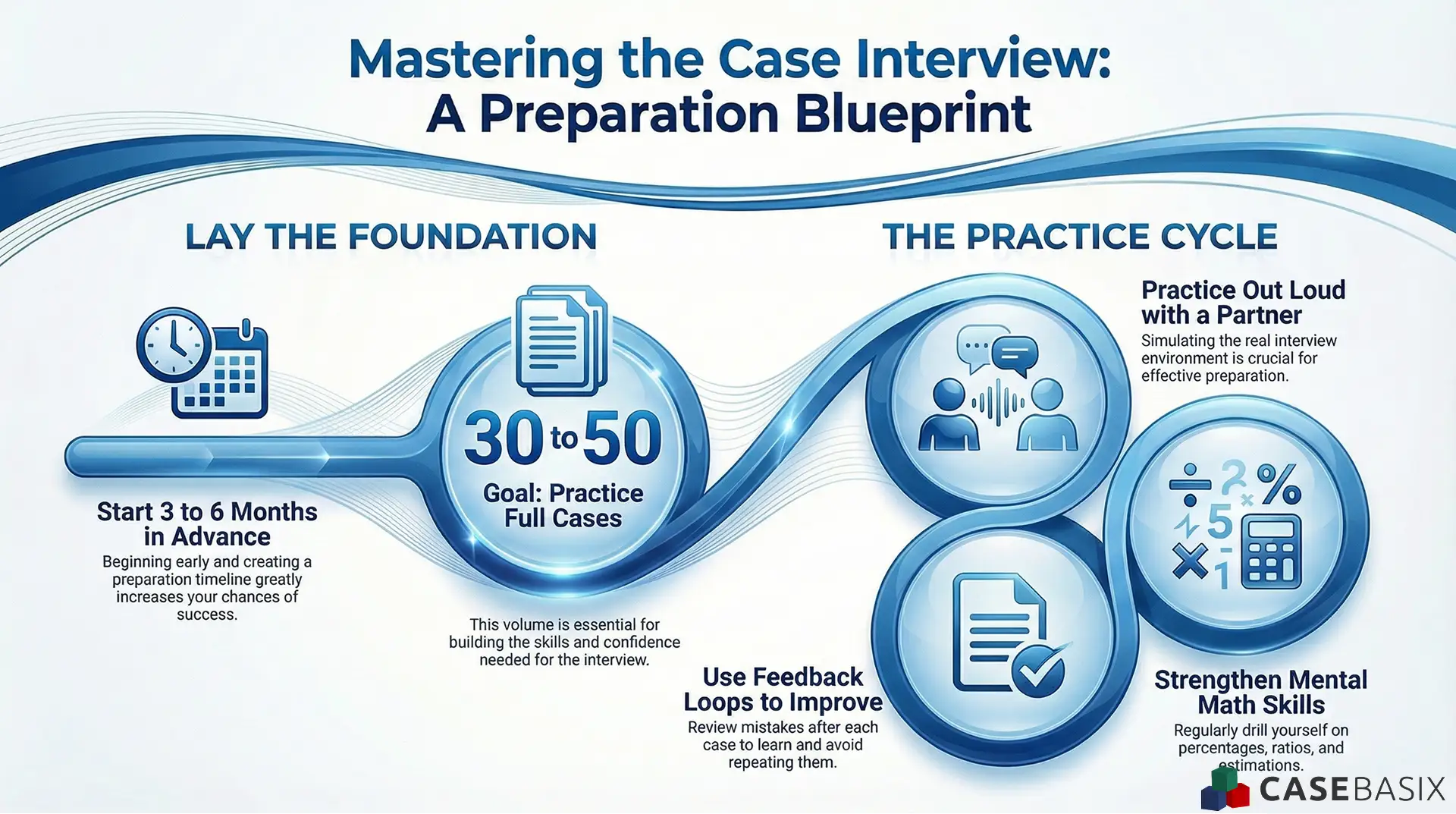
This infographic provides a clear preparation blueprint to help candidates build strong case interview skills over time.
This visual highlights the core habits that lead to consistent improvement when preparing for case interviews. Following a structured timeline and practicing deliberately helps you build confidence and master the skills interviewers expect.
The best way to prepare for a case interview is to practice 30 to 50 full cases out loud, strengthen mental math skills, and refine structured problem-solving. Starting early and creating a preparation timeline increases your chances of success.
Case interview preparation is most effective when it combines structured practice and feedback. Quiet study is not enough; you need to simulate the real interview environment.
Steps for effective preparation:
- Timeline: Begin 3 to 6 months in advance if possible
- Practice out loud: Simulate real interview conditions with a partner
- Use feedback loops: Review mistakes after each case to avoid repeating them
- Mix formats: Include profitability, market entry, and industry-specific cases
- Math drills: Regularly test yourself on percentages, ratios, and estimations
For example, MBA candidates often start casing the summer before interviews, while undergraduates should begin by spring for fall recruiting. Experienced hires on shorter timelines can adapt with more intensive practice schedules.
What not to do in a case interview?
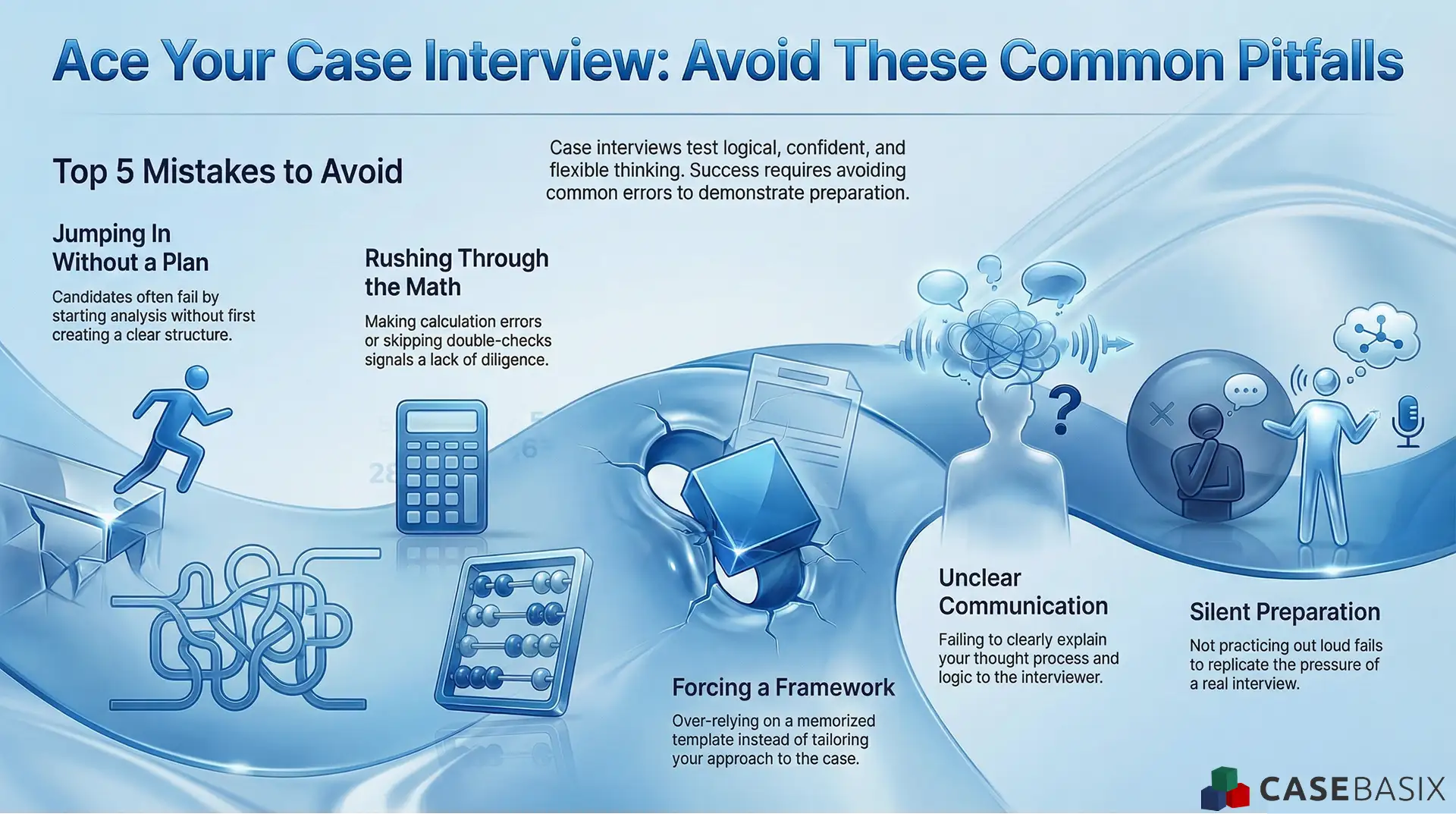
This infographic highlights the top pitfalls candidates should avoid to perform confidently and effectively in a case interview.
This visual reinforces the most common issues that limit strong case performance and helps you understand what interviewers look for. Avoiding these mistakes allows you to present your analysis with clarity and confidence.
The biggest mistakes in a case interview are failing to structure your approach, rushing through math, overusing memorized frameworks, and not practicing out loud. These errors make candidates appear unprepared and reduce their chances of success.
Interviewers look for logical, confident, and flexible thinking. Avoiding common pitfalls is just as important as learning techniques.
Mistakes to avoid include:
- Lack of structure: Jumping into analysis without a plan
- Weak math: Making calculation errors or skipping double-checks
- Over-reliance on frameworks: Forcing a template instead of tailoring to the case
- Poor communication: Speaking unclearly or not explaining your logic
- Not practicing out loud: Failing to replicate interview conditions
For example, many candidates lose points by skipping a recap of the problem. This small step shows structure and allows the interviewer to correct misunderstandings early.
How to tell if a case interview went well?
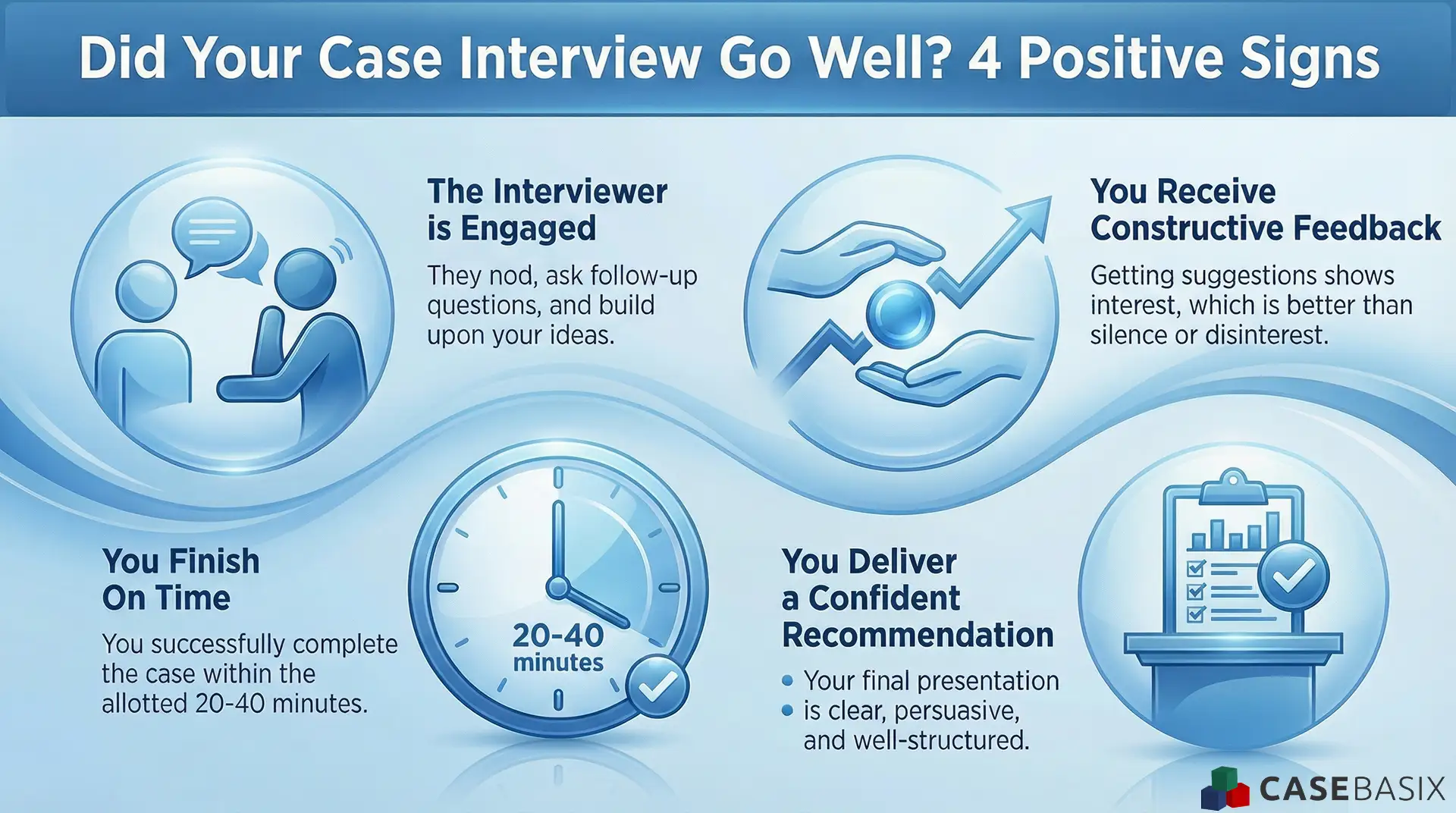
This infographic highlights the key indicators that suggest your case interview performance was strong and well received.
These signals help you understand how interviewers assess performance beyond the final answer. Recognizing these cues gives you clearer insight into your strengths and areas to refine for future interviews.
You can tell a case interview went well if the interviewer stays engaged, encourages your thinking, and gives constructive feedback at the end. Finishing on time with a clear recommendation is also a positive sign.
There are no guarantees, but positive signals often include:
- Engagement: The interviewer nods, asks follow-up questions, or builds on your ideas
- Constructive feedback: You receive suggestions rather than silence or disinterest
- Time management: Completing the case within the allotted 20 to 40 minutes
- Confident delivery: Presenting recommendations clearly and persuasively
For example, if your interviewer challenges you with extra data or pushes back on your logic, it often indicates they see potential and want to test your resilience rather than end the conversation.
Frequently Asked Questions:
Q: What are the disadvantages of a case interview?
A: The disadvantages of a case interview include high stress, time pressure, and reliance on case interview frameworks that may not fully reflect real consulting work. Some candidates also find the format harder if they lack prior exposure to consulting case studies.
Q: What questions to ask during a case interview?
A: The best questions to ask during a case interview are clarifying questions about objectives, data, or assumptions. Asking smart questions shows structured problem solving and strong case interview preparation.
Q: How many applicants get to the final interview?
A: The number of applicants who get to the final interview is usually less than 10% of total candidates. In the consulting recruitment process, only those with strong case interview performance and fit interview skills advance that far.
Q: How long from final interview until offer?
A: The time from final interview until offer is typically one to three weeks. In management consulting interviews, timelines vary depending on firm size, recruiting cycle, and how quickly the hiring team makes final decisions.
Q: How difficult are case interviews?
A: Case interviews are difficult because they test problem-solving, communication, and math under time pressure. With structured practice, most candidates can significantly improve their performance.




